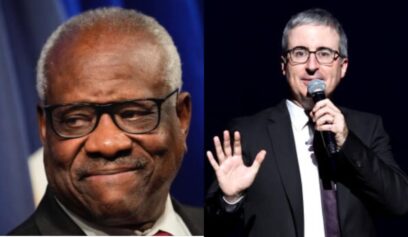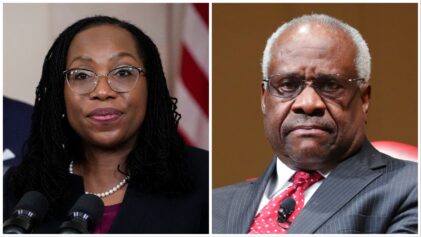
As explored in the documentary, Hill is credited with bringing the whole concept of sexual harassment to the nation’s consciousness. But according to profiles of the documentary in a number of publications, “Anita” focuses more on Hill’s life after her testimony and the awareness her accusations elicited than on the nasty politics of the confirmation hearing that led to Thomas’ seat on the court.
For those three days in October 1991, the nation was transfixed by the University of Oklahoma Law School professor who told the Senate Judiciary committee explicit details about the actions of Thomas, her former boss, including that he put pubic hair on a Coke can; told her about the kind of pornography he watched; bragged about his penis size; and asked her on dates, 10 or so times, even though he was her boss.
The senators didn’t know what to do with her allegations—at one point, Sen. Howell Heflin, Democrat from Alabama, asked the 35-year-old tenured law professor if she was “a scorned woman.” Ultimately, of course, Thomas was voted onto the court.
Hill told the Associated Press that after refusing requests for years to collaborate on a film about her experiences, she finally said “Yes” because she realized the issues still resonate. She was also inspired by the reactions she got after it was revealed in 2010 that she’d received a voice mail from Thomas’ wife, Virginia, asking Hill to “consider an apology.” The recording of that voice mail opens the film.
“People responded with outrage to that,” Hill said to AP. “But even more, I realized that here we are 20 years later and the issues are still resonating — in the workplace, in universities, in the military. So if 1991 could help us start a conversation, how then can we move this to another level? Because clearly we haven’t eliminated the problem.”
“Back then, this was an invisible issue, until Anita testified,” said Marcia D. Greenberger, founder and co-president of the National Women’s Law Center. Greenberger said Hill’s testimony raised public consciousness about sexual harassment in the workplace and spurred other women to make claims. It also helped the passage of the Civil Rights Act of 1991, which addressed issues of employment discrimination.
“That happened in direct response to the growing realization of what the American public had seen in the hearings,” Greenberger said.
Hill, who still regularly gets hate mail, admits that her personality is not well-suited for the role of heroine.
“In some ways I’m not very well suited, I think, for that position of heroine,” she said. “People do want that person who is sort of out there and vocal and adamant about who they are and what they want. But I wouldn’t be credible if I didn’t come to this with my own personality.”
Hill, who currently teaches at Brandeis University, said her graduate students were only children in 1991 and the undergrads weren’t even born, so many of them don’t even know how famous she is.
“It doesn’t bother me,” she says. “It’s important to help them focus on what their learning objectives are, and not on me as a person.”
But filmmaker Mock said Hill still gets a rise out of people.
“I had no idea she was a rock star,” Mock told AP. “But it’s a routine: People stand up when she walks in. They shout: ‘I love you!’ and ‘I believe you, Anita!'”
“She was a reluctant witness, and she remains a reluctant public figure,” Mock adds. “But she is proud to be a part of this journey that she never intended to be on.”
One of the most striking visuals in the film, according to press reports, is the sight of the all-white, all-male panel accosting Hill.
“Can you believe it was JUST 22 years ago?” Hill said in an interview. “It’s like ‘Mad Men’!”
“It was such a harsh contrast between who they were, and me and how I looked, in that blue suit,” she said. “It was a reflection of their power and privilege. And I think the public saw that and related to me — though at the time, I just felt isolated.”
If the hearings were to happen now, Hill believes they would be much different.
“I do not believe we would have an (Sen.) Alan Simpson saying ‘that sexual harassment crap,’ for example,” she said. “The conversation has changed. We as a society have accepted that these are important issues.”


